If you’re considering entering the Iranian market, you’re probably aware of the complexities involved in international trade. A Simple Guide to Entering the Iranian Market; Choosing the Right Legal Structure for Foreign Investment is designed to help you navigate this process. At Libralaw, we understand that diving into a new market, especially one like Iran, comes with its own set of challenges. But don’t worry; you don’t have to navigate this alone. Our team of legal experts is here to help.
With different legal structures available, deciding how to establish a presence can feel overwhelming. Whether you’re aiming to expand your business, tap into new opportunities or lay the groundwork for long-term success in Iran, choosing the right legal framework is key. In the following sections, we’ll walk you through the most common ways foreign investors establish themselves in Iran, so you can make well-informed decisions that align with your business objectives.
So, if you’re looking for guidance on how to enter the Iranian market and set your business up for success, keep reading. We’re here to make the process clearer and help you take the right steps forward.
What Legal Structures Can Foreign Investors Choose in Iran?
Entering the Iranian market requires a clear understanding of the legal structures available to foreign investors; These options, which include fully foreign-owned companies, joint ventures, branch offices and representative or liaison offices, each come with distinct advantages and challenges.
The key to a successful market entry lies in selecting the right legal framework that matches your business strategy, objectives and long-term vision. For more insights on common legal mistakes businesses make when choosing legal structures, see our article «Top Legal Mistakes Businesses Make and How a Law Firm Can Help You Avoid Them». Whether you’re looking for autonomy or a collaborative approach with local stakeholders, knowing which structure suits your needs is crucial.
Here’s an expanded breakdown of the main types of foreign company presence under Iranian law:
1. 100% Foreign Legal Entity
Under current Iranian regulations, foreign companies are allowed to establish and fully own (100%) legal entities in the country’s Free Trade Zones (FTZs) without any special procedures or legal ownership restrictions; This policy provides a unique opportunity for international investors to enter the Iranian market with minimal bureaucratic obstacles. The Free Trade Zones are designed to attract foreign capital, promote industrial development and facilitate international trade.
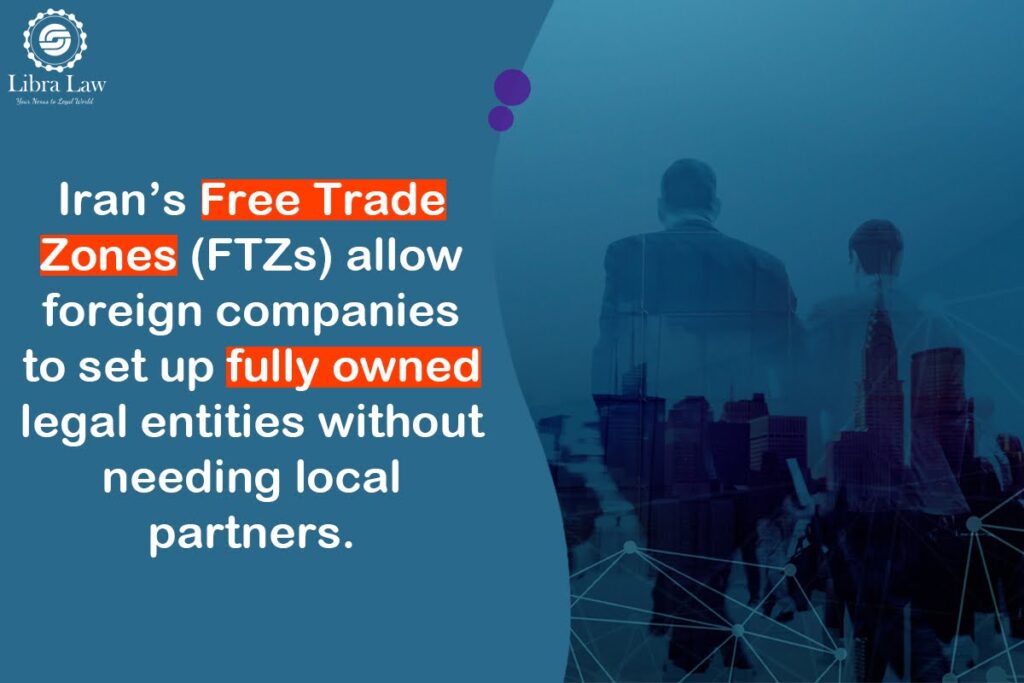
- Key Benefits of FTZs for Foreign Investors
One of the most attractive features of establishing a business in an FTZ is the array of investment incentives available. The most significant of these is a 15-year tax holiday, which allows companies to operate without paying corporate income taxes for an extended period; This makes FTZs an appealing option for companies looking to minimize their initial operational costs while establishing their presence in Iran.
However, these incentives are not unconditional. They are contingent upon the majority of the business activity being conducted within the FTZ. If a company’s operations extend significantly beyond the zone, it may lose access to these benefits. Therefore, companies must ensure that their core business functions remain within the boundaries of the FTZ to retain the tax advantages.
- Why Should You Choose an FTZ for Business Setup in Iran?
FTZs are particularly well-suited for foreign companies engaged in industrial activities such as assembly, packaging, and light manufacturing. These zones offer the necessary infrastructure and logistical support to facilitate trade and production, making them ideal for businesses that want to:
1. Export Goods: FTZs often serve as strategic hubs for exporting products to both mainland Iran and other markets in the Middle East and Central Asia; They offer easy access to transportation networks, simplifying the process of reaching a broader regional market.
2. Test the Market: FTZs can be an effective starting point for foreign companies testing the Iranian market with minimal risk; They provide a relatively low-barrier entry, allowing investors to assess the local demand for their products or services before committing to larger investments on the mainland.
For more insights on minimizing business risks and leveraging legal strategies to accelerate growth, refer to our article «Legal Moves That Help Businesses Grow Faster and Safer».
3. Tax and Duty Incentives: The tax holidays and customs exemptions offered in FTZs can provide significant cost savings, allowing foreign businesses to reinvest these savings into operations or expansion.
- What Are the Limitations of Using FTZs for Long-Term Business in Iran?
While FTZs offer a convenient entry point, they may not be the most effective platform for long-term strategic investment. Several factors contribute to this:

1. Geographic Limitations: The majority of Iran’s consumer demand, economic activity, and infrastructure are located outside the FTZs, in mainland Iran; This means that companies relying solely on operations within FTZs may struggle to reach a broader market or tap into the full potential of the Iranian economy.
2. Local Partnerships: In practice, foreign companies may face an informal but strong preference for partnering with Iranian stakeholders when seeking to expand operations beyond the FTZ; This may stem from the local expertise in navigating Iran’s regulatory environment, access to government contracts and an understanding of the socio-political dynamics. Foreign investors are often encouraged to enter joint ventures or partnerships with Iranian firms to mitigate risks and facilitate growth.
3. Expansion Beyond FTZs: For companies aiming to establish a more significant, long-term presence in Iran, transitioning from an FTZ to mainland Iran becomes inevitable. The mainland offers a larger and more diverse consumer base, advanced infrastructure and access to more substantial business opportunities, making it the logical next step for foreign investors looking to expand their reach.
Establishing a 100% foreign-owned legal entity in one of Iran’s Free Trade Zones offers significant advantages, including tax incentives, ease of market entry and access to regional trade opportunities; It provides a low-risk platform for companies involved in industrial activities or those testing the Iranian market. However, for long-term investors who seek to tap into Iran’s vast domestic market and take advantage of its economic growth potential, FTZs may serve more effectively as a stepping stone rather than the final destination. As operations grow, foreign investors are likely to consider expanding their presence beyond the FTZs and forming partnerships with local firms to navigate the complexities of the mainland market.
2. Iranian Company through a Joint Venture
A Joint Venture (JV) is a business arrangement where two or more parties—usually a foreign company and a local partner — collaborate to pursue a specific business opportunity. In the context of Iran, foreign companies often form JVs with local Iranian companies as a preferred method of market entry; This structure allows foreign investors to leverage local expertise, networks and regulatory knowledge, while also benefiting from government incentives aimed at encouraging foreign investment.
The JV model enables both parties to share resources, risks, and rewards in a manner that ensures mutual benefits. JVs are typically employed for large projects or those that require specialized local knowledge or regulatory navigation.
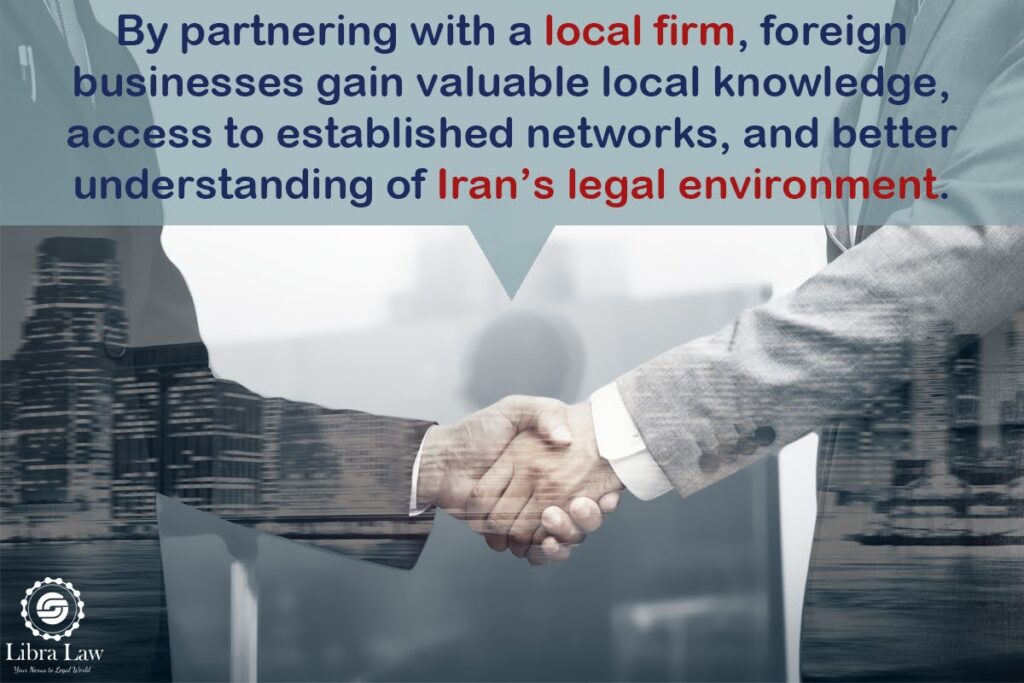
- Entry through Joint Ventures
Foreign companies looking to invest directly in Iran often choose to enter the market through a joint venture (JV) with a local Iranian company; This form of entry is strongly encouraged by the Iranian government because it promotes long-term foreign commitment, job creation and local participation in business activities. A joint venture provides foreign investors with local market knowledge and the opportunity to work closely with a trusted Iranian partner, which helps navigate the regulatory environment more effectively.
- Legal Framework and Business Structures
Iran does not have specific laws dedicated exclusively to joint ventures. Instead, foreign and Iranian partners rely on the Iranian Commercial Code to establish their corporate structure. The most common business structure for joint ventures is a private joint-stock company, which requires a minimum of three shareholders. Other permissible structures under the Iranian Commercial Code include limited liability companies, limited partnerships and general partnerships. The Commercial Code clearly defines the rights and obligations of shareholders within each structure. To further govern their relationship and ensure a smooth operation, partners typically enter into a shareholders’ agreement.
- Shareholders’ Agreement and Legal Safeguards
If the foreign investor holds a minority stake in the joint venture, it is crucial to design adequate legal safeguards to protect their rights and interests; These safeguards should be included in both the shareholders’ agreement and the company’s articles of association. The agreement will typically address voting rights, profit-sharing arrangements and mechanisms for dispute resolution, ensuring that the foreign investor’s interests are preserved in decision-making processes and operations.
To ensure that your interests are protected and any future disputes are resolved efficiently, click here.
- Requirement for a Specific Project
The Foreign Investment Board typically requires joint ventures to be linked to a concrete business project. A JV that is formed without an associated project is less likely to be supported; This is because Iranian authorities want to ensure that foreign investment is directed towards projects with tangible outcomes, contributing to the local economy. Moreover, forming a joint venture solely to establish a future presence in Iran may be considered unsuitable.

Additionally, the Iranian Company Registration Office may refuse to register a company with substantial foreign ownership unless the investor obtains approval and a license under the Foreign Investment Promotion and Protection Act (FIPPA), which ensures that foreign investments are protected and regulated. “If you’re unfamiliar with the details of FIPPA’s protection mechanisms, our article «Foreign Investment in Iran; How FIPPA Protects Your Capital» covers everything you need to know.
- Independence of the Registered Entity
A company registered in Iran is regarded as 100% independent from its shareholders, including the foreign investor; This means that the company operates as a separate legal entity and is subject to local governance and regulatory requirements. As part of this, the company is required to hold regular board meetings and shareholder meetings to comply with Iranian corporate governance rules. Foreign investors will need to actively manage their relationship with other shareholders to ensure effective operations and to maintain good standing with Iranian authorities.
- Limitations on Flexibility
Under the joint venture structure, the foreign investor will be represented through a single corporate entity for all future projects; This could limit the investor’s flexibility in selecting partners or determining the level of Iranian participation on a project-by-project basis. The foreign investor may find it difficult to independently negotiate or manage each project, as the JV structure inherently requires the involvement of the Iranian partner; This can impact the foreign investor’s ability to make independent decisions on future projects and partnerships.
Establishing a joint venture in Iran provides foreign investors with a strategic way to enter the market by leveraging local knowledge and resources. While the structure offers various advantages, such as regulatory guidance and government incentives, it also comes with challenges, particularly in terms of flexibility and control over decisions. Understanding the legal framework and carefully negotiating terms in the shareholders’ agreement are crucial steps to ensure a successful and mutually beneficial partnership.
3. Branch Office
Under Iranian law, foreign companies legally established in their home countries can apply to register a branch office in Iran, as long as their home country allows the registration of Iranian companies under similar reciprocal conditions. The process of establishing a branch or representative office in Iran offers foreign companies numerous opportunities, including facilitating business operations, expanding their market reach, and fostering long-term partnerships in the region.
What Purposes Can a Branch Office Serve in Iran?
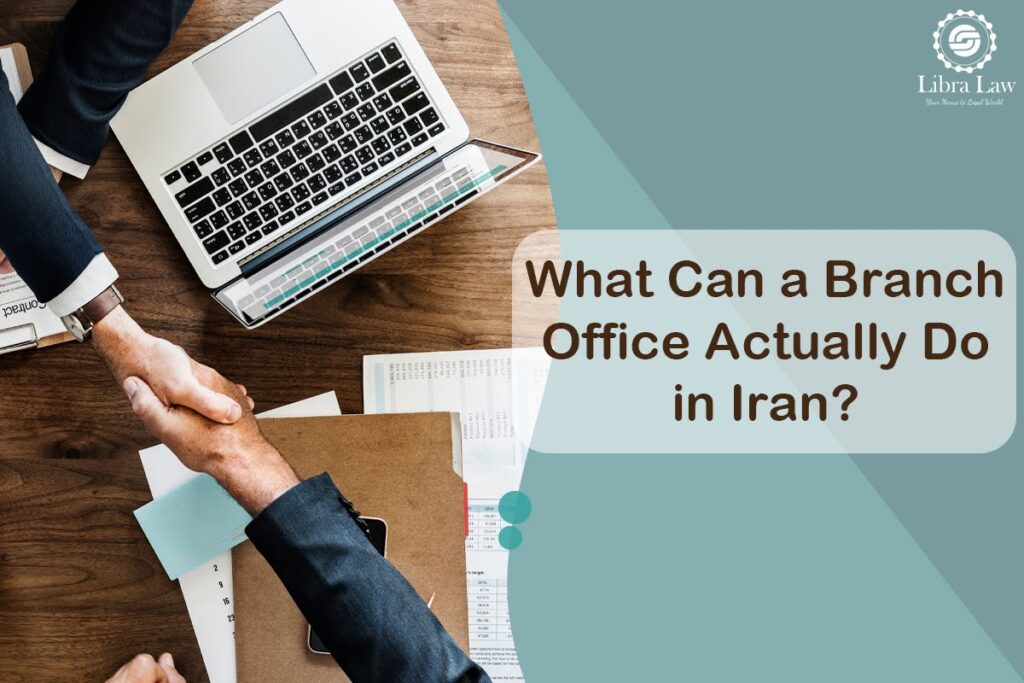
Foreign companies may register a branch office in Iran for several critical business activities:
1. After-Sales Services: Providing maintenance, technical support and customer service for products and services already sold in Iran.
2. Contract Execution: Managing and executing contracts between Iranian and foreign companies, ensuring smooth operations and compliance with local regulations.
3. Market Research & Investment: Conducting feasibility studies and preparing for potential investments in Iran, understanding the local market and analyzing future opportunities.
4. Collaboration with Iranian Firms: Partnering with Iranian technical and engineering companies to execute projects in Iran or other countries, thus expanding business networks.
5. Promotion of Non-Oil Exports: Assisting in the promotion and marketing of Iranian non-oil products to international markets.
6. Technology Transfer: Delivering technical services, training and transferring technology and know-how to Iranian businesses to foster growth and development.
7. Legal Business Activities: Conducting licensed activities in sectors such as transportation, insurance, banking and marketing, with the required government authorization.
- Common Industries Utilizing Branch Offices in Iran
Many foreign companies across various sectors have chosen to register branch offices in Iran, including:
1. Oil and Energy Sector: Foreign oil companies often set up branches in Iran to manage contracts with the National Iranian Oil Company (NIOC), including buyback agreements and exploration contracts.
2. Product Sales and Marketing: Companies selling products to Iran may establish branches to coordinate after-sales services and market their goods, creating a more direct link to Iranian consumers and businesses.
3. Banking and Financial Services: Foreign banks with branches in Iran help facilitate financial transactions and manage relationships between their parent company and the Iranian banking system, ensuring smooth cross-border transactions.
4. Foreign Companies Exploring Market Presence:
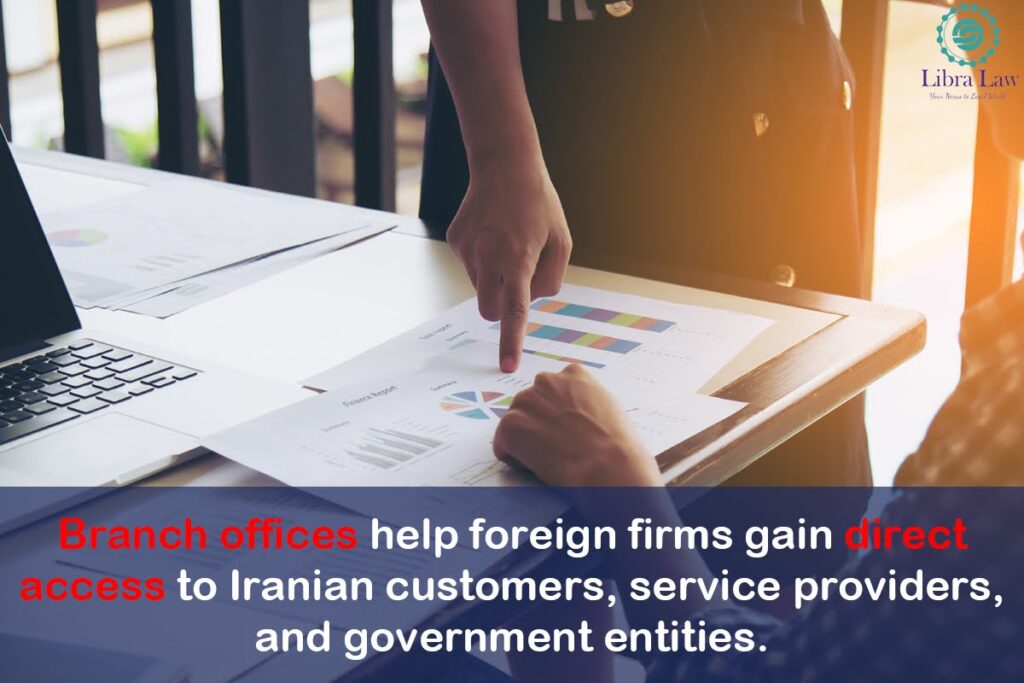
Branches are a strategic way for foreign companies to gain insights into the Iranian market, network and build relationships, particularly as part of a long-term entry strategy.
What Are the Strategic Advantages of Branch Offices in Iran?
For foreign investors aiming to establish a presence in Iran, registering a branch office provides several significant advantages:
1. Direct Market Access: This route provides the most transparent and straightforward entry into the Iranian market, allowing the foreign company to directly engage with Iranian businesses and consumers.
2. Autonomy and Branding: By establishing a branch, a foreign company can operate under its own name, maintaining its brand identity and business practices without relying on third-party intermediaries.
3. Operational Flexibility: Foreign companies can sign contracts, hire staff, and lease office space directly in Iran; This reduces the complexity of managing operations through local agents or representatives.
4. Banking and Financial Flexibility: Branch offices can open both local and foreign currency bank accounts, providing greater flexibility in managing finances.
5. Consistency in Management: A branch operates as an extension of the parent company, meaning there is no ambiguity in control or management structure; This reduces risks associated with managing subsidiaries or local partners.
6. Avoiding Conflicts of Interest: Unlike local agents or representatives, a branch ensures that there are no potential conflicts of interest, offering more control over business operations and strategy.
7. Market Insights and Partner Development: Establishing a branch office helps foreign companies gather valuable insights into the market, identify potential business partners and monitor key industry developments to stay ahead of competition.
What Are the Tax Implications for Branch Offices in Iran?
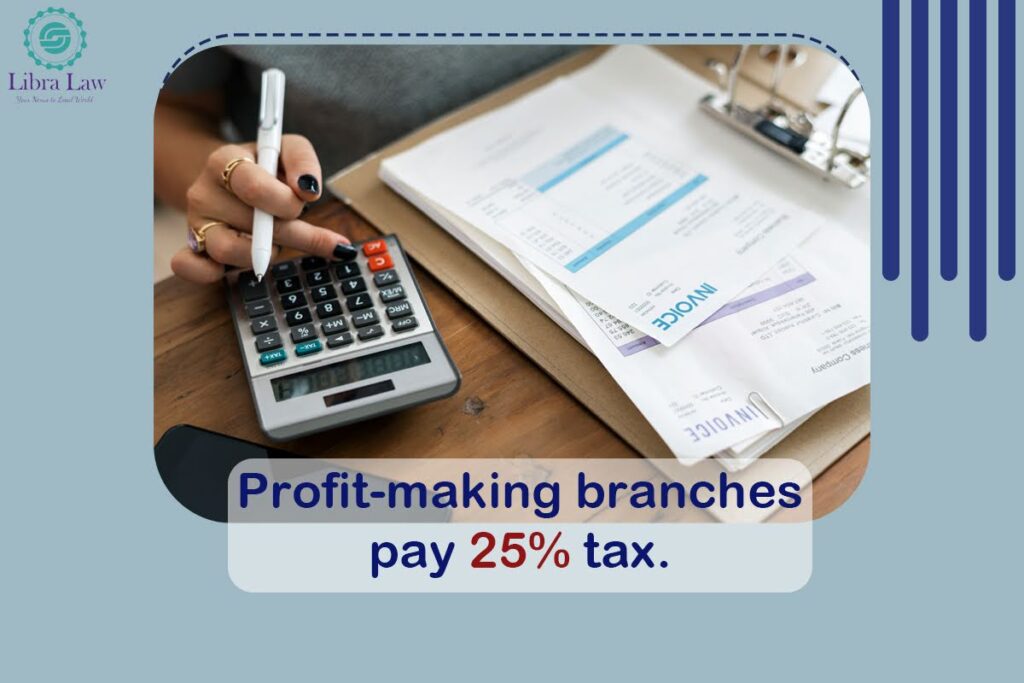
The tax structure for branch offices in Iran is generally straightforward. If the branch functions solely as a cost center (i.e., not generating independent revenue), it may not incur taxes. However, if the branch is profit-oriented, it will be taxed on a profit and loss basis, with a standard tax rate of 25%. It is essential to consult with local tax advisors to fully understand the tax obligations associated with branch operations.
- Registration Process
Registering a branch office in Iran is relatively simple. The process involves legalizing and translating the parent company’s documents for submission to the relevant authorities in Iran. Once registered, the branch can start operations, including pursuing specific projects, hiring staff and engaging in commercial activities in compliance with local laws.
- Future Project Execution
Once a project is identified, foreign investors can utilize the branch office for its execution. Depending on the project’s scope, the foreign investor may either use the branch office directly or establish a joint venture with Iranian stakeholders to operate in the market.
Registering a branch office in Iran offers foreign companies a legally sound, flexible and direct method of establishing a presence in the country; It provides strategic control, operational efficiency, and access to key markets without the complexities of forming a local company. While ideal for executing contracts, delivering services and building market presence, companies should carefully consider regulatory, tax and sector-specific factors when planning their entry. For long-term growth, a branch office can serve as a strong foundation for deeper integration into the Iranian economy.
4. Representative/Liaison Office
A representative or liaison office is a common approach for foreign companies, particularly those involved in trading goods and services, to establish a presence in Iran; This type of office typically operates through an Iranian firm or individual who serves as an intermediary, facilitating the foreign company’s activities within the Iranian market. Representative offices generally function on behalf of multiple foreign companies, acting as a link between the foreign entity and local stakeholders.
What Roles Can a Representative Office Play for Foreign Companies?
For foreign companies involved in trade, a representative office can serve as an effective vehicle to enter the Iranian market. The key advantages for foreign companies in establishing a representative office are:
1. Market Access:

By utilizing a local representative or liaison office, foreign companies can leverage the expertise, local knowledge and contacts of the representative to effectively market and sell their products within Iran.
2. Sales and Marketing: The representative usually works on a commission basis, providing direct incentives to market and sell the foreign company’s products; This model encourages the representative to engage actively in the promotion and sale of products.
3. Cost-Effective Entry: Compared to establishing a branch office, setting up a representative office can be less costly and less administratively complex; It allows foreign companies to explore market opportunities with a relatively low commitment.
What Are the Limitations of Representative Offices in Iran?
While a representative office may be beneficial for companies involved in trading goods and services, it may not always be the most suitable choice for foreign investors looking to establish a deeper, long-term presence in Iran. Several challenges need to be considered:
1. Finding a Suitable Representative: One of the first challenges foreign investors face is identifying a reliable and capable local representative; This requires extensive market research and due diligence to ensure that the selected representative has the right expertise and reputation to handle the investor’s interests. The representative’s activities will directly impact the foreign company’s reputation in the Iranian market.
2. Conflict of Interest: A significant challenge with representative offices is the potential conflict of interest. The representative may have financial interests tied to multiple clients, creating a situation where their impartiality in serving any single client may be compromised; This could affect the quality of advice and focus provided to the foreign investor.
3. Limited Attention and Resources: In many cases, representatives serve a variety of foreign companies, which could lead to a lack of dedicated attention and focus on a single client’s needs; This may result in suboptimal service or a lack of customized solutions tailored to the investor’s objectives in the Iranian market.
4. Inadequate Infrastructure: While representatives are often skilled in marketing and sales, they may lack the infrastructure and resources needed to support more complex business operations; This could be a particular concern for foreign investors who are looking to build a more substantial and integrated presence in the Iranian market, such as for large-scale projects or joint ventures.
When Is a Representative Office Suitable?

For foreign companies involved in importing and selling products in Iran, a representative office can be a suitable and efficient method of market entry. The ability to tap into a local representative’s network and marketing expertise allows companies to quickly enter the market with lower initial investment.
However, foreign investors considering long-term projects, strategic partnerships, or large-scale investments in Iran may find a representative office less appropriate. The potential limitations in control, attention and infrastructure could hinder the investor’s ability to implement complex business strategies or maintain a strong presence in the market.
A representative or liaison office can serve as a valuable tool for foreign companies focused on sales, marketing, and establishing initial contact with the Iranian market. However, careful consideration should be given to the potential drawbacks, such as finding a reliable representative and the limitations in infrastructure and focus. For companies seeking more control and a deeper commitment to the Iranian market, alternative structures like branch offices may be more appropriate.
| Legal Structure | Description | Key Benefits | Limitations/Considerations |
100% Foreign Legal Entity (FTZ) | Foreign companies can fully own businesses within Iran’s Free Trade Zones (FTZ) without restrictions. FTZs are designed to promote trade and attract foreign investments. | – 15-year tax holiday.- No corporate income tax during this period.- Ease of entry with minimal bureaucracy.- Tax and customs exemptions. | – Geographically limited to FTZs.- May lose incentives if operations extend outside FTZ.- Limited access to Iran’s broader market.- Need to shift focus to the mainland for long-term growth. |
Joint Venture (JV) | A collaboration between foreign and Iranian companies to pursue specific business projects. The JV structure is encouraged by the government for projects with local and foreign interests. | – Local market expertise.- Shared resources, risks and rewards.- Access to government incentives. | – May limit flexibility in decision-making.- Foreign investors may have less control if they hold a minority stake.- Requires a concrete business project for approval. |
Branch Office | Foreign companies can establish a branch office to operate in Iran; It allows them to execute contracts, provide after-sales services and promote non-oil exports. | – Direct market access.- Autonomy and branding.- Operational flexibility.- Greater control over operations. | – Taxed on profits (25% rate if profit-oriented).- Limited to specific activities (e.g., after-sales services, market research).- Requires legal and bureaucratic processes to establish. |
Representative/Liaison Office | Foreign companies can set up representative offices to facilitate trade, market their products and build networks; This office functions as an intermediary to connect foreign entities with local businesses. | – Cost-effective entry.- Local knowledge and networks.- Allows sales and marketing focus. | – Limited to non-revenue-generating activities (e.g., market research, promotion).- May face conflicts of interest with representatives handling multiple clients.- Limited infrastructure for large-scale operations. |
What Are the Key Factors to Consider Before Entering the Iranian Market?
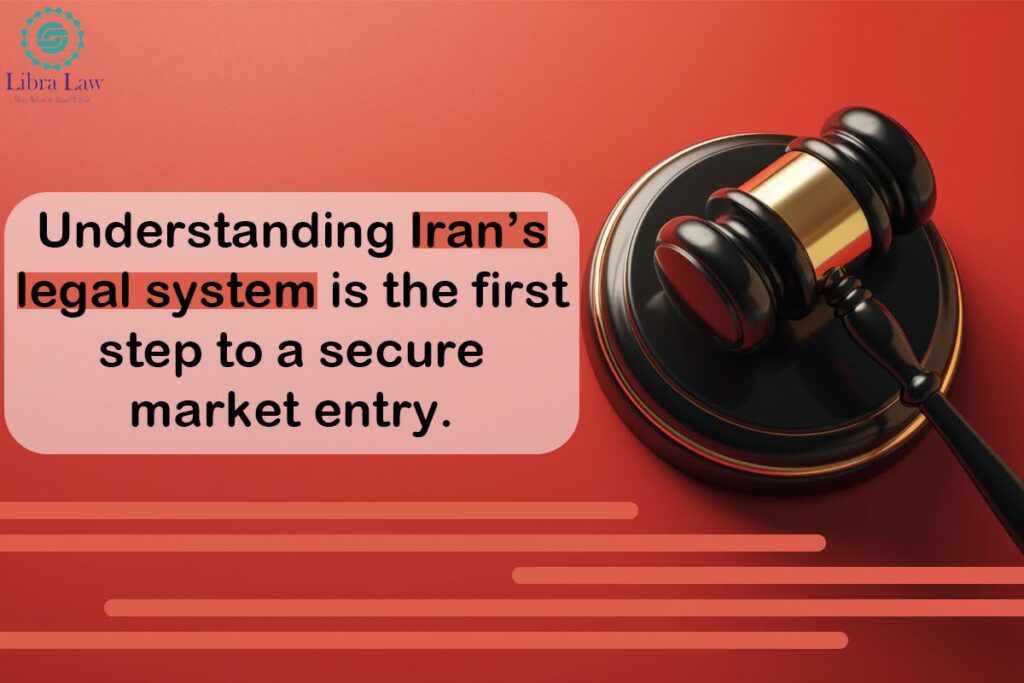
Entering the Iranian market requires a thorough understanding of local regulations, business practices, and strategic goals. Below are key points to consider when evaluating different entry options:
1. Understanding the Legal Framework
Iran’s legal environment is multifaceted, combining modern commercial practices with a complex regulatory structure. Investors must familiarize themselves with local laws governing business formation, foreign ownership, tax policies and other regulatory requirements. A strong legal foundation is essential for ensuring compliance and avoiding future complications.
2. Selecting the Right Legal Structure
The decision to choose between a branch office, joint venture, or fully foreign-owned entity is critical. Each structure has distinct advantages and challenges based on business needs. For instance, a branch office may be ideal for foreign companies looking for a low-risk, flexible entry point. However, those with long-term goals, such as manufacturing or distribution, may require a joint venture to ensure control over operations and profits.
3. Branch Office as a Low-Risk Entry
A branch office offers foreign companies an excellent way to establish a presence in Iran without the complexity of forming a local company; It allows for market exploration, business development and after-sales services, all while maintaining control over operations. This structure is particularly useful for companies looking to gauge market potential without committing heavily to the region in the early stages.
4. Joint Venture for Long-Term Commitment

For businesses planning to stay in Iran long-term, particularly in sectors like manufacturing or product distribution, a joint venture (JV) may be a more suitable structure. A JV allows for shared ownership, risk and profit, making it easier to integrate with local businesses and comply with Iranian laws; It can also help mitigate cultural or operational challenges by tapping into local expertise.
5. Fully Foreign-Owned Company for Full Control
A fully foreign-owned entity may be necessary for companies that require complete control over operations, decision-making and profit-sharing; This structure is more suited for businesses with significant investments or those looking to maintain complete autonomy, particularly in sectors where foreign ownership is permitted (like in Free Trade Zones).
6. Taxation and Regulatory Compliance
Iran’s tax system can be complicated, and foreign companies need to understand the local tax policies, including rates for profits, employees and potential exemptions. If you want to dive deeper into the specifics of Iranian tax laws, please refer to our article, «A Practical Guide to Iranian Tax Laws for Foreign Investors».
Additionally, Foreign Investment Promotion and Protection Act (FIPPA) registration is required for foreign investors, which offers protections for their investments. Being fully aware of these requirements helps avoid financial pitfalls and ensures long-term success.
7. Due Diligence on Shareholder Rights and Local Laws
Legal due diligence is vital when setting up any business structure in Iran; This includes understanding the rights of shareholders, the scope of foreign ownership and local labor laws. Investors should ensure they comply with all local regulations, including potential changes to business law, which can affect how companies operate. Consulting with local legal and tax advisors is highly recommended to navigate these complexities.
8. Geopolitical and Regulatory Risks
Iran’s geopolitical environment and regulatory landscape are dynamic. The country’s international relations, sanctions and internal political climate can affect business conditions. Foreign investors must stay updated on any shifts in policy and regulations to adjust their strategy accordingly.
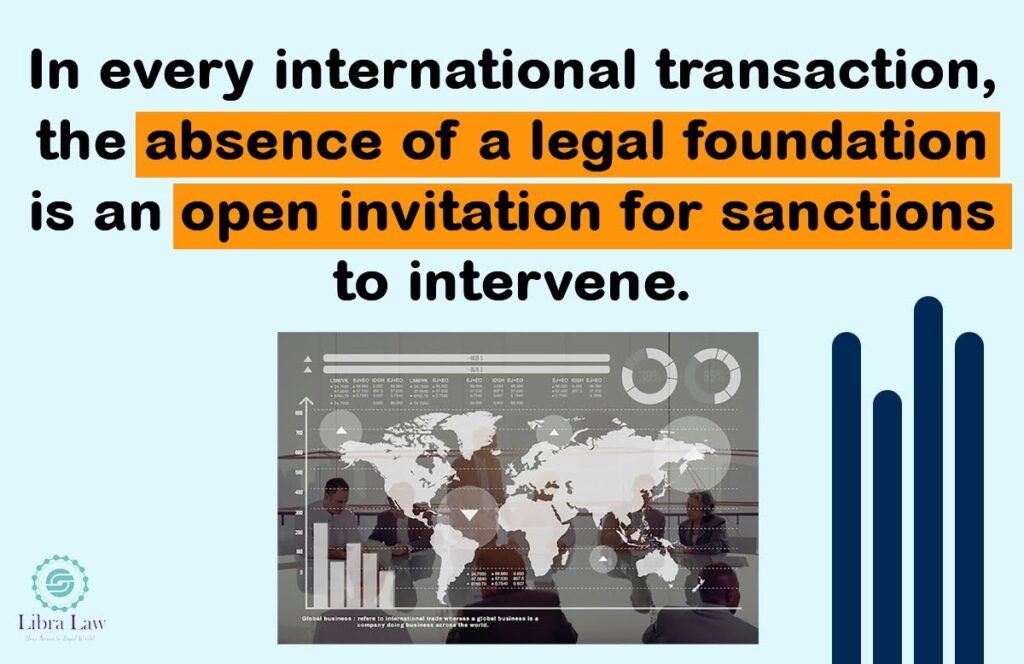
Entering the Iranian market presents both significant opportunities and challenges. The choice of business structure, whether a branch office, joint venture or fully foreign-owned entity, depends on the company’s goals, risk tolerance and long-term strategy. Regardless of the path chosen, thorough legal due diligence, understanding local regulations and staying informed about geopolitical factors are essential for successful market entry. With careful planning and the right approach, foreign investors can tap into Iran’s growing market while navigating its complexities effectively.
For more comprehensive insights into navigating the legal landscape and selecting the right business structure, refer to our article «The Complete Legal Guide for Foreign Investors in Iran», which provides detailed explanations of all available options.
Based on the insights provided, it’s clear that entering the Iranian market can be a complex process, requiring careful consideration of the legal framework and business structure. Whether you are considering a fully foreign-owned entity, joint venture, branch office or representative office, each option presents unique advantages and challenges.
Given the intricacies involved in choosing the right approach for your business, it is crucial to consult with legal experts who specialize in Iranian business law. Professional legal advice can help ensure that you select the most suitable structure based on your business goals, regulatory requirements and long-term strategy.If you require assistance or legal advice regarding foreign investment in Iran, the experts at LibraLaw are ready to support you. With extensive experience in Iranian market entry and foreign investment, we can provide you with tailored guidance to help navigate this complex landscape. Contact us today to ensure you make well-informed decisions and successfully establish your business presence in Iran.


